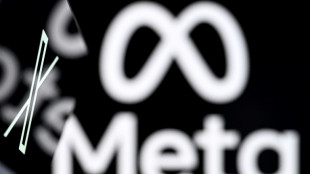
-
 US freezes almost all aid except for Israel, Egypt arms: memo
US freezes almost all aid except for Israel, Egypt arms: memo
-
Trump threatens aid cutoff on US disaster zone visits

-
 US freezes almost all aid except for Israel, Egypt: memo
US freezes almost all aid except for Israel, Egypt: memo
-
Guardiola promises Man City 'will be back' next season

-
 US stocks retreat while yen gains on Bank of Japan rate hike
US stocks retreat while yen gains on Bank of Japan rate hike
-
Rubio clashes with China FM on Taiwan

-
 The four Israeli women hostages to be freed on Saturday
The four Israeli women hostages to be freed on Saturday
-
LA prosecutors say won't charge Marilyn Manson with sexual assault

-
 Sabalenka, Keys wind up for big-hitting Australian Open final
Sabalenka, Keys wind up for big-hitting Australian Open final
-
Serbians strike in protest over fatal roof collapse

-
 Mega-iceberg drifts towards Antarctic penguin island
Mega-iceberg drifts towards Antarctic penguin island
-
'We want peace': Colombians swept up in bloody guerrilla violence

-
 Fear stalks DR Congo city Goma as artillery fire shakes ground
Fear stalks DR Congo city Goma as artillery fire shakes ground
-
Sudan army breaks paramilitary siege on Khartoum HQ, reclaims oil refinery

-
 Zelensky warns Putin wants to 'manipulate' Trump on Ukraine
Zelensky warns Putin wants to 'manipulate' Trump on Ukraine
-
England defender Walker joins AC Milan from Man City

-
 Hamas says four women soldiers to be freed in next swap with Israel
Hamas says four women soldiers to be freed in next swap with Israel
-
US anti-abortion rally celebrates Trump's return

-
 Meta plans to invest $60 bn or more in AI this year
Meta plans to invest $60 bn or more in AI this year
-
Opening arguments expected in A$AP Rocky shooting case

-
 Power cuts and transport chaos as Storm Eowyn hits Ireland and UK
Power cuts and transport chaos as Storm Eowyn hits Ireland and UK
-
Trump visits North Carolina and California disaster zones

-
 Rodgers ready for Celtic life without Japan star Furuhashi
Rodgers ready for Celtic life without Japan star Furuhashi
-
Frankfurt sign Wahi as Marmoush replacement

-
 Migrants held in US sanctuary city as Trump moves army to border
Migrants held in US sanctuary city as Trump moves army to border
-
Veteran Ogier roars into Monte Carlo Rally lead

-
 Drifting mega-iceberg could threaten remote baby penguins
Drifting mega-iceberg could threaten remote baby penguins
-
French mother sentenced to life for daughter's starvation death

-
 Croatians boycott shopping to protest high prices
Croatians boycott shopping to protest high prices
-
Nuno wary of praise for high-flyers Forest

-
 Tiger's Genesis Invitational moved to Torrey Pines from LA
Tiger's Genesis Invitational moved to Torrey Pines from LA
-
Pinturault's Kitzbuehel crash again highlights ski risks

-
 Van Nistelrooy dismisses fears over own future at slumping Leicester
Van Nistelrooy dismisses fears over own future at slumping Leicester
-
Pandas, like Trump, are back in Washington

-
 Israel says Lebanon troop pullout 'will continue' beyond 60-day deadline
Israel says Lebanon troop pullout 'will continue' beyond 60-day deadline
-
Hamas names hostages to be freed in next swap with Israel

-
 Kvaratskhelia 'ready' for PSG debut this weekend
Kvaratskhelia 'ready' for PSG debut this weekend
-
Putin says he is ready for talks with Trump on Ukraine

-
 US home sales in 2024 weakest in nearly 30 years
US home sales in 2024 weakest in nearly 30 years
-
Sudan army breaks paramilitary siege on key base: military source

-
 DR Congo battles intensify, Western nations ask citizens to leave Goma
DR Congo battles intensify, Western nations ask citizens to leave Goma
-
Meta profits from known pro-Russian disinfo network: researchers

-
 Trump heads to disaster zones amid emergency funding row
Trump heads to disaster zones amid emergency funding row
-
'White wall' of ice drifts toward remote penguin haven

-
 Stocks diverge as investors weigh earnings, Trump policies
Stocks diverge as investors weigh earnings, Trump policies
-
Vinicius 'wants to make history at Real Madrid', says Ancelotti

-
 Louvre opens first fashion exhibition after shock memo about decay
Louvre opens first fashion exhibition after shock memo about decay
-
Beached whales: Airbus grounds its massive Beluga cargo flights

-
 Postecoglou says Spurs players need help in transfer window
Postecoglou says Spurs players need help in transfer window
-
Amorim in the dark over Rashford's Man Utd future


Croatians boycott shopping to protest high prices
Supermarket aisles were quiet across Croatia on Friday as consumers protested high food prices by joining a boycott on shopping.
Fanned by social media campaign, Croatians largely stayed away from shops, with daily sales volume down 50 percent from last Friday, the country's tax administration said in a statement.
The protest, initiated by consumer groups, aimed to pile pressure on retailers they blame for surging inflation.
Only a few customers were in a central Zagreb supermarket at midday that is usually bustling with shoppers at that hour.
"Retailers will not be financially harmed, but this is an important symbolic message that price gouging should stop", Danko Horvat, a barman from Zagreb who joined the boycott, told AFP.
Consumer groups said they were satisfied with the response.
The boycott shocked retailers, said Josip Kelemen from the "Halo, inspektore" consumer protection group, which called for the protest.
"People feel cheated," Kelemen said. "Even the well-off have supported us, they feel the same way."
The boycott was also backed by opposition parties, trade unions, some local celebrities as well as two ministers.
Local media reports and posts on social media showed empty stores across Croatia.
Prime Minister Andrej Plenkovic called the boycott an "important and articulated message from people that they do monitor and compare prices" at home in Croatia and in neighbouring countries.
Prices on many goods can be considerably lower in Slovenia and Italy.
The premier went on to say that the concerns would be taken into account next week when the government reviews a list of products that are under price controls.
Experts point to Croatia having one of the highest value-added tax (VAT) rates as one reason for higher prices in the country.
In December, the country's 4.5 percent annual inflation rate was the highest in the eurozone, where the average stood at just 2.4 percent.
Consumer groups have repeatedly complained that prices have risen steadily since Croatia adopted the euro as its currency in January 2023.
The average net salary in Croatia was 1,366 euros ($1,420) in November, official figures show.
S.Keller--BTB
